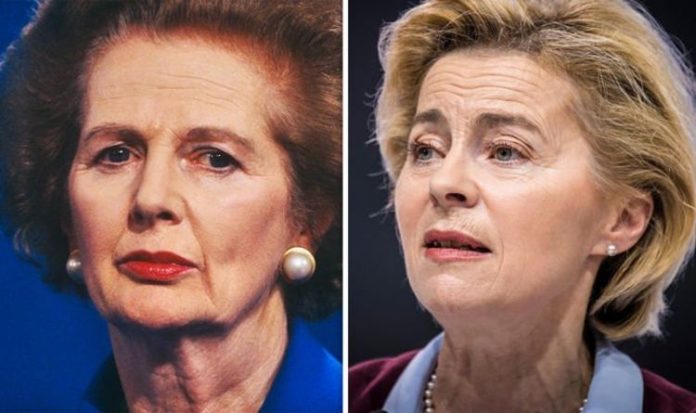Margaret Thatcher slammed by Geoffrey Howe in 1990 speech
After 11 months of fraught and bitter negotiations, Britain and the EU have reached a post-Brexit trade deal. For the last 48 years, EU membership has constricted Britain’s ability to have decisions taken, policies set and laws made by people who are directly accountable for those choices. However, in less than ten days, Britain will finally put an end to eurosceptic frustration and regain its independence.
On December 31, the transition period will come to an end, meaning the country will say goodbye to the bloc and open a new chapter of its national history, as a “global free-trading nation”.
As Brexiteers around the country have already started celebrating, newly released government archives shed light on former prime minister Margaret Thatcher, providing more evidence of her disdain for Europe in the final days of her premiership.
Notes from 1990, released under the 30-year rule, reveal the former prime minister described plans for a single European currency as a “rush of blood to the head”.
She also called for the European Commission to be turned into a professional civil service.
During talks with her Irish counterpart, Charles Haughey, Baroness Thatcher hit out at the “politburo” in Brussels, vowing not to be dictated to.
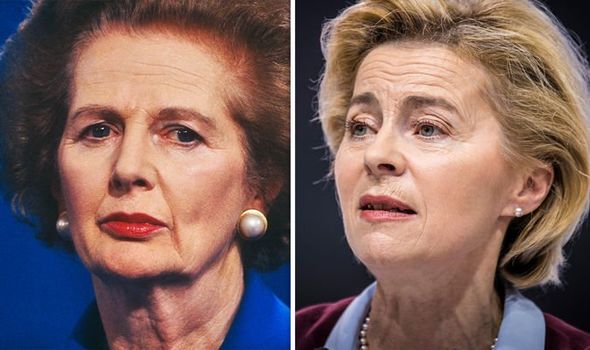
Margaret Thatcher’s brutal analysis of ‘politburo’ EU proves why Britain left bloc (Image: GETTY)
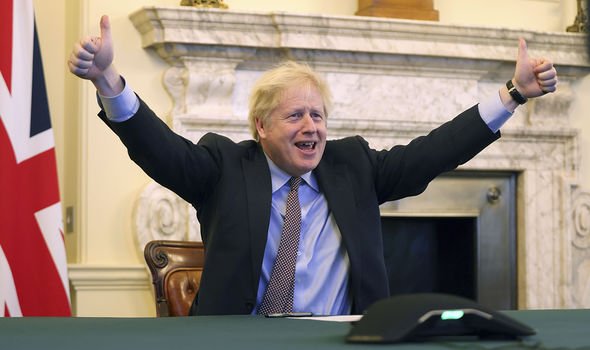
Prime Minister Boris Johnson announced ‘the deal is done’ on Christmas Eve (Image: PA)
The former prime minister compared giving away powers of taxation to gifting sovereignty to Europe, the Dublin archives show.
It was over the issue of Europe, and the divisions it caused in the Conservative Party, that led to her being ousted from Downing Street.
An Irish Government note quoted Mrs Thatcher as saying: “In talking of a single currency, Delors must have had a rush of blood to the head.
“We are not going to have a single currency.”
Jacques Delors – who Baroness Thatcher also referred to as a “mere appointee” in the notes – was the president of the European Commission at the time and he is considered to be the father of the euro and single market.
JUST IN: Yanis Varoufakis tipped Germany as FIRST country leave eurozone

Five key moments that led to Brexit (Image: EXPRESS.CO.UK)
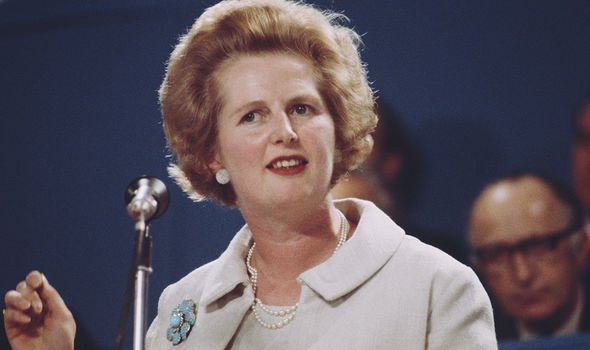
Former Prime Minister Margaret Thatcher (Image: GETTY)
Baroness Thatcher wanted to turn the Commission into a professional civil service, without the power of initiative, whose job would be to service the Council of Ministers – which represents national governments in Europe.
She said: “The days of appointed commissioners must be numbered.
“We must give power to the Council of Ministers.
“I am not handing over authority to a non-elected bureaucracy.”
The notes also show Baroness Thatcher getting “completely fed up” with the European Economic Community – the precursor to the EU – trying to tie Britain up with “bureaucratic regulations”.
At the time, Soviet Union control over eastern Europe was collapsing, leading Baroness Thatcher to say: “We are trying to get eastern Europe to accept democratic standards and here we are recreating our own politburo.”
DON’T MISS:
Dan Hannan warns THREE countries will follow UK out of bloc [EXCLUSIVE]
Boris Johnson’s non-tariff barriers claims torn apart by trade experts [ANALYSIS]
EU’s chart hints NEW deal could be agreed further down line [INSIGHT]
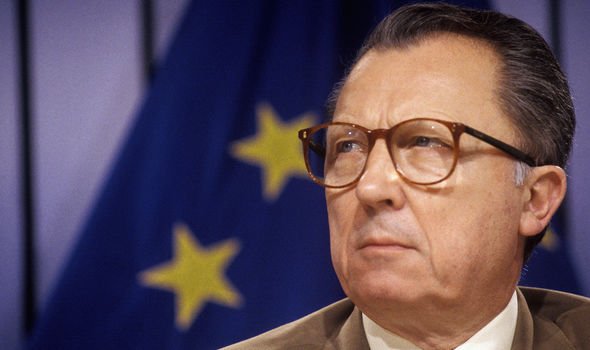
Former President of the European Commission Jacques Delors (Image: GETTY)
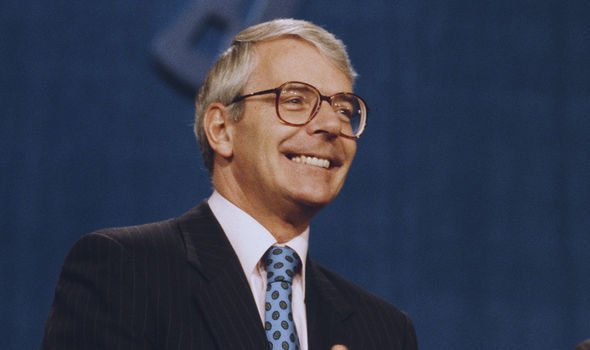
Former Prime Minister John Major (Image: GETTY)
She said while the Commission had been necessary “to start off” it was a “totally non-democratic power structure now”.
It was not long after she made those comments that Mrs Thatcher was ousted from Downing Street.
Following Michael Heseltine’s challenge to her leadership in 1990, which was sparked partly because of issues over European policy in her Cabinet, the Iron Lady was forced to resign as Prime Minister and Sir John Major eventually succeeded her.
In 1999 BBC documentary “The Major Years”, Sir John claimed that once he got the keys to Downing Street, he immediately felt the relationship between Britain and the EEC had to change.
He said: “When I became Prime Minister, the relationship with our European partners was frankly rather poor.
“They took the view that the British stood apart, they shouted from the terraces but they rarely engaged in the main game.
“I thought the best way to proceed was to go into Europe and set out my concerns, my hopes, my aspirations, the things I would concede, the things I couldn’t accept in a speech actually inside Europe.”
According to the documentary, Sir John’s speech, during which he expressed his desire to place “Britain at the heart of Europe”, was designed to offend Mrs Thatcher and please the Europeans.
Jacob Rees-Mogg says Maastricht Treaty was ‘a step too far’
Many political observers along with the Iron Lady were stunned by Sir John’s words and they saw it as a betrayal.
Referring to Mrs Thatcher’s reaction to Sir John’s EU policy, former home secretary Lord Baker said: “The battle lines were drawn up.
“On a visit to America, Margaret Thatcher made her concerns about Europe plain in a series of speeches.
“She was totally opposed to the greater involvement in Europe, the greater move to federalism.
“She had stood up very strongly against that. The no, no, no, no at the despatch box in the House of Commons and she saw that being weakened.
“That certainly intensified her disenchantment of John Major.”
Sir John ended up signing the Maastricht Treaty in 1992, which saw what was then the European Community evolve into the European Union with initially only 12 member states.
It laid down the groundwork for economic and monetary union with a single currency at its heart and new rules on inflation, debt and interest rate regulations.
It prompted Baroness Thatcher to launch a ferocious warning about the EU to Sir John, accusing him of “putting his head in the fire” and claiming that the Treaty would have “diminished democracy and increased bureaucracy” in Britain.
The former prime minister, who had previously signed the Single European Act, said in 1993: “Our trust was not well-founded.
“We got our fingers burnt.
“The most silly thing to do when you get your fingers burnt is to bring forward a bigger and worse Act which is the equivalent of putting your head in the fire.”
Speaking months later in the House of Lords about Maastricht, Baroness Thatcher also claimed: “I could never have signed this treaty.”
